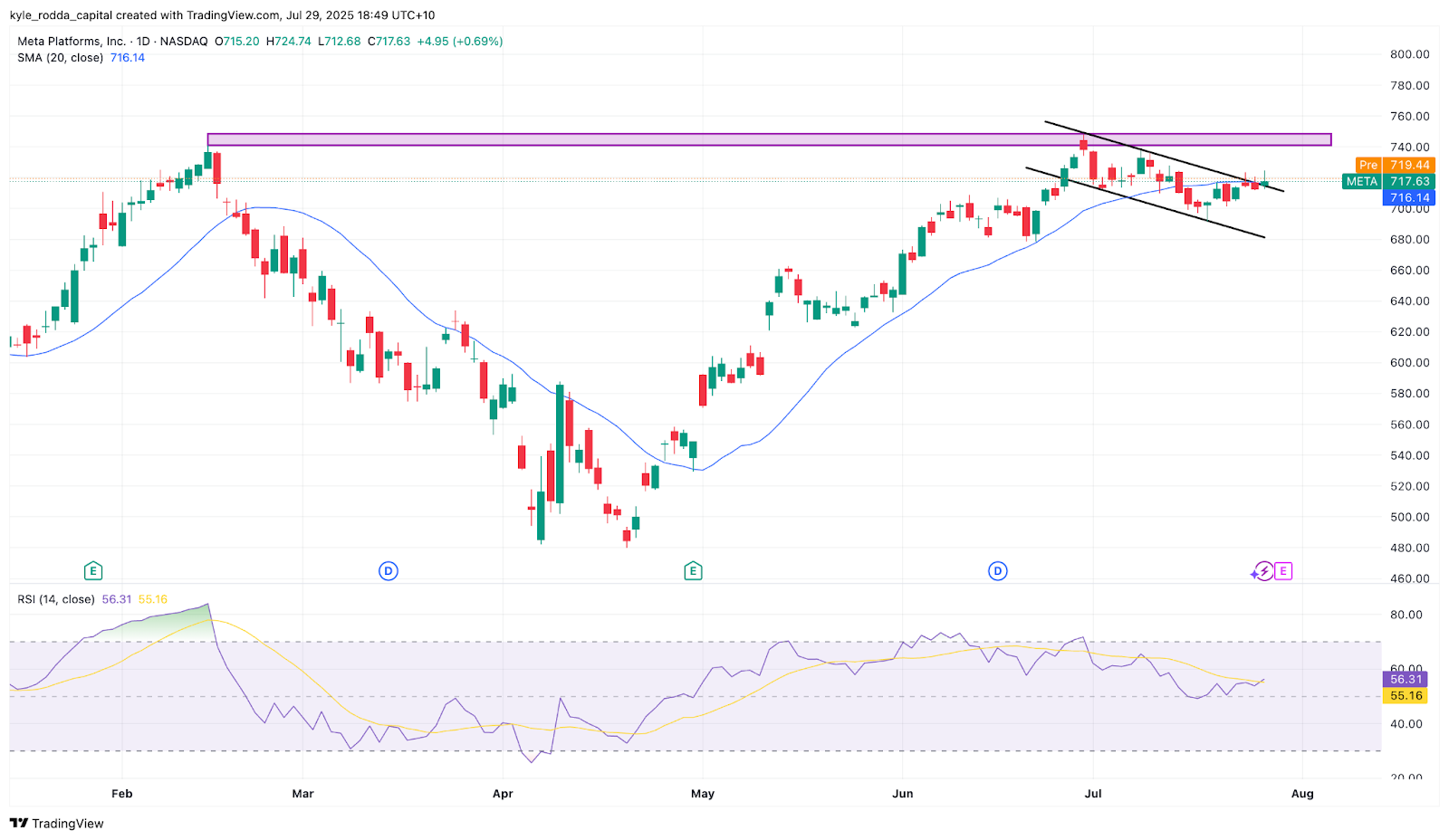Meta earnings preview: Strong Q2 expected, but investors look for balance between AI investment and monetisation
Expectations are high for Meta Platforms as investors look for a balance between AI monetisation and investment
Meta Platforms is due to report its second-quarter earnings after the market close on 30 July. The stock has been a standout performer in 2025, up more than 20% year-to-date despite periods of extreme volatility, and expectations are high heading into the print.
Revenue growth expected to stay strong as margins stabilise
Meta’s top-line growth is expected to remain robust, supported by resilient digital ad spending and further monetisation of its messaging platforms. For Q2, analysts project revenue of $44.83 billion, which would mark a 15% year-on-year increase. Adjusted EPS is forecast to come in at $7.62, up more than 47% from the same quarter last year. Net income is expected to rise to $19.9 billion, with margins broadly higher at around 44%. Operational efficiency remains a key narrative, and Meta’s results will likely reinforce the idea that the company is sustaining strong profitability even while investing heavily in infrastructure.
Meta faces AI investment balancing act
Meta’s capital expenditures have been on an upward trajectory as the company ramps up investment in AI infrastructure. Management has indicated a desire to build large-scale computer clusters to support the development of its LLMs and Superintelligence Labs. For the June quarter, capex is expected to reach $16.3 billion, which would represent a sharp rise from the $12.9 billion reported in Q1. While investors have thus far rewarded Meta’s bold AI push, there are growing concerns about the impact on free cash flow and margins in the second half of the year. Estimates suggest FCF could fall sequentially to $6 billion, down from over $11 billion in Q1.
Investors seek clarity on Reality Labs and capex guidance
Another point of scrutiny will be the outlook for Reality Labs. Losses for the segment have widened in recent quarters, with tariff headwinds and hardware costs also rising. Investors will be watching closely for any signs that Meta may scale back or reprioritise spending in this area, especially as broader macro uncertainty persists. Management commentary around forward capex guidance will be key, with some analysts speculating that full-year spending could exceed $70 billion. Any indication that capital intensity will moderate could be met with a positive market reaction.
Meta’s valuation is rich as investors pay-up for AI growth
Meta’s stock has rallied sharply in 2025 and is currently trading near all-time highs. At around $716 per share, the company trades at 27.4 times forward earnings, a premium to its historical average. With a 12-month consensus target of $748, the implied upside is limited at just 5%, suggesting that much of the good news is already priced in. Meta's outperformance versus the broader market has been driven by optimism over its AI roadmap, strong financial execution, and aggressive cost controls. However, with sentiment stretched, even small disappointments could trigger volatility in the near term.
Investors remain bullish on Meta as AI buzz continues
Analyst sentiment remains overwhelmingly positive ahead of earnings, with 88.8% of ratings a ‘Buy’ and only one ‘Sell’ recommendation among the 92 analysts covering the stock. Meta has beaten EPS expectations in eight consecutive quarters, and the implied move based on options pricing is around 6.7%. This suggests that market participants are bracing for volatility, with investor reaction likely to hinge on forward guidance around spending and margins.
Meta’s technicals also affirm the bullishness for the stock. It remains in an uptrend, having reached new record highs in June. While upward momentum has slowed, the stock appears to be consolidating rather than reversing for now, potentially staging a breakout to the upside. A solid set of earnings could boost the stock to re-test new highs. A poor set of figures could inspire a pull back, with the $700 per share level a critical psychological pivot point.

(Source: Trading View)
(Past performance is not a reliable indicator of future results)